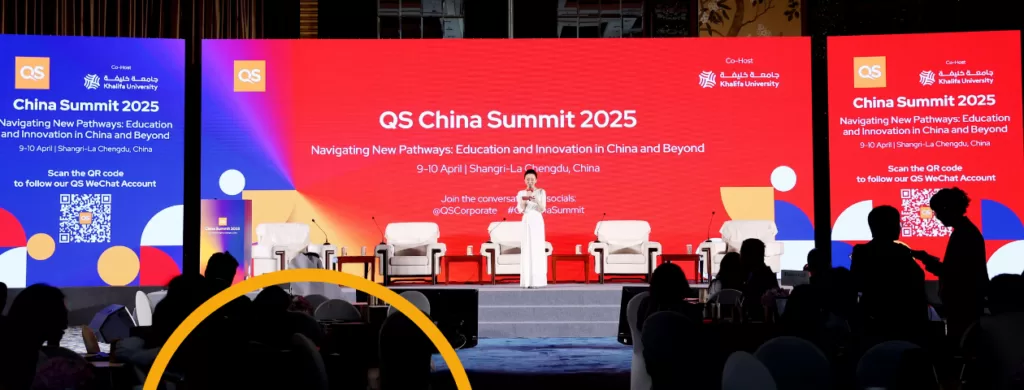
Struggling to understand the role of MOOCs in the future of higher education? We sat down with edX’s Kathy Pugh to find out more.
Massive open online courses (or MOOCs) are defined as, “free online courses available for anyone to enroll.” This provides a flexible and affordable alternative to traditional higher education offerings.
The 2019 Wharton-QS Reimagine Education conference will cover the role of MOOCs in the shifting global higher education landscape, as well as a range of other trends in the sector.
In the leadup to the conference, we sat down with Kathy Pugh, Vice President of Services at edX, to discuss how MOOCs have evolved over the years and where they’re heading next.
Since The New York Times dubbed 2012 the ‘year of the MOOC,’ how have you seen MOOCs evolve?
Kathy: Starting around 2012, most platforms and institutions were offering single online courses at scale. Many of these courses followed a traditional semester–long course format, in terms of the time needed and the number of weeks it took to complete.
Fairy early on, it became clear that learners were looking for sequences of online courses that would lead them to building a deeper level of competency and a valuable credential.
Given this, we started offering a course series in 2013 and we established the breakthrough MicroMasters® program credential that stands on its own merits and gives the learner the option to earn a full master’s degree; Professional Certificate programs that are recognized by learners and employers worldwide; and online master’s degrees that greatly reduce the cost of the degree and remove the barriers of time and place.
With the continued demand for programs and innovative credentials, you can count on edX to continue to develop more breakthrough programs for learners everywhere.
Another notable development in the evolution of MOOCs was how quickly edX offered MOOCs for credit. In 2015, edX, in partnership with Arizona State University, became the first to provide undergraduate credit for MOOCs.
Since that time, MOOCs and other online programs have been accepted for credit at hundreds of universities worldwide. Then, of course, there is the MicroMasters® program certificate that is a credential with a pathway to credit, allowing learners who earn the credential and are accepted into a master’s program to convert it into a credit equivalent of up to 25% of the full master’s degree.
How can MOOCs providers improve completion rates and ensure students finish their courses?
Kathy: When talking about completion rates, I think it’s most important to reframe the discussion as one about outcomes.
For example, edX attracts learners who have many different desired outcomes—from students with a traditional focus on demonstrating mastery of the course and receiving a certificate from edX or earning a MicroMasters® program credential to people who enroll solely to interact with other students and expand their understanding of the world around them. Given this, course completion may not be the desired outcome for every learner.
That said, if we look at career–related outcomes coupled with completion rates, 87% and 81% of learners who have completed a MicroMasters® or Professional Certificate program report positive career outcomes, respectively.
With many MOOCs students living in developed countries, how can MOOCs better fulfill their potential and truly democratize education globally?
Kathy: Society and humankind need all those involved in expanding educational opportunities to the underserved (including educational institutions, technologists, governments, internet and hardware providers, NGO’s, etc.) to work together to truly democratize education.
edX and our partners are focused on doing our part by providing access to a world–class open source education platform, Open edX; collaborating with governments and their educational organizations (e.g. Israel, France, Russia, Saudi Arabia, Malaysia, and Jordan) and providing affordable access to courses and programs from the world’s top higher education intuitions.
We welcome opportunities to collaborate with others to further democratize education.
What advice would you give to MOOCs providers about engaging and attracting students globally?
Kathy: I believe the most critical advice I can give is to experiment with approaches and to be open to shifting the paradigm away from traditional in–person education and embrace blended and fully online methods.
Also, many people have read about the need for lifelong learning and the fourth industrial revolution. Learners around the world are looking for resources to help them meet their economic needs and career aspirations.
Likewise, companies around the world are looking for innovative ways to skill and re-skill their employees to meet their needs today and in the future.
My advice is for MOOC providers to look for ways, conventional and innovative, to play a role in meeting the needs of both learners and companies.
Where do you see MOOCs heading in the future? How will they evolve?
Kathy: In the future, we see an unbundled approach to education, unbundling credit, time, and content to create an approach that does not require learners to spend four years on campus.
By creating more opportunities for learners to take courses online and earn credit, we see new pathways to campus, credit, and careers emerging for learners everywhere.
We look forward to continuously experimenting with online education by offering credentials that are valued by employers and universities.
While MOOCs are still sought after by tens of thousands of learners every month, we also see learners looking for programs. They are seeking out programs that can help them develop a deep understanding and competence in a certain subject area.
They are looking for credentials such as the edX Professional Certificates or MicroMasters® programs that they can add to their professional CV and LinkedIn profile, in order to demonstrate skills and knowledge to current and potential employers.
Kathy Pugh – alongside other world-leading educational experts – will be participating in the 2019 Wharton-QS Reimagine Education Awards and Conference – ‘the Oscars of Education’ – from the 8-10 December 2019 in London. Register now to join more than 600 educational innovators and decision makers from universities and edtech alike at this global conference.



